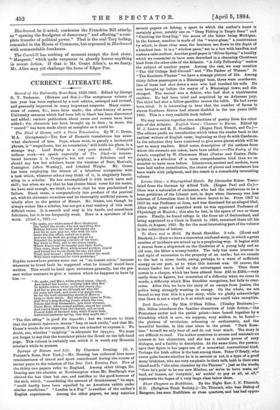The Iliad of Homer, with a Verse Translation. By W.
C. Green,
M.A. (Longmans)—The flow of Homeric translations has some- what slackened of late. Pope, whose work, to parody a hackneyed
phrase, is "magnificent, but no translation," still holds his place, in a strange way. Lord Derby is a very poor second. Cowper's tedious work—we speak especially of The Iliad—is remem- bered because it is Cowper's, but not read. Scholars, and we should say few but scholars, know the versions of Dart, Merivale, Conington (after Worsley), and Ichabod Wright. Mr. Green has been employing the leisure of a laborious occupation with a task which, whatever othels may think of it, is singularly fascin- ating to a scholar. He has accomplished it with much taste and skill; but when we say that he has chosen blank verse for his metre, we have said enough, we think, to show that he was predestined to failure. Blank verse, a comparatively late product of the poetical art, with its elaborate structure and its thoroughly artificial pauses, is wholly alien to the genius of Homer. Mr. Green, too, though he always writes like a scholar, has not got a real mastery of this most difficult verse. It is smooth and easy in his bands, and sometimes felicitous, but it is too frequently weak. Here is a specimen of his work. (Iliad v., 767) :— "He spake, nor white-armed Here disobeyed,
But lashed the steeds, who not unwilling flew Midway between the earth and starry sky. And far as man may see, who with his eyes Scans the dim offing, seated on a peak.
And o'er the dark sea gazing, e'en so far Bounded the neighing coursers of the Gods.
But when to Troy, and to the rivers twain, Where Simois and Swmander join their floods, They came, there Here, white-armed goddess, stayed And loosed her horses from the car, and shed Thick mist around ; while Simois clothed the mead With blade ambrosial for their pasturage."
Dryden somewhere praises some one as "an honest critic," because whenever he found fault he suggested what he himself would have written. This would be hard upon reviewers generally, but the pre- sent writer ventures to give a version which he happens to have by him :— "He spake, and Het e, white-armed queen, obeyed, And lashed her horses; nothing loath they flew In middle course lain earth and starry sky, And far as one can see through air who sits On some tall rock, and looks o'er purple seas, So far the loud-resounding steeds of Heaven Leap in their stride. But when they came to Troy, And Tray's deep-flowing rivers, where the two, Simois and deep Scamander, join their streams, There Here, white-armed goddess, stayed her steeds, And lowed them from the chariot, and around Poured folds of thickest mist, while S,mois bade Ambrosial pastures spring, that they might eat."
"The dim offing" is good for ilepoeiVs ; but we venture to think that the present epclw-Kovcrt means "leap at each stride," and that Mr. Green's words do not express, if they are intended to express it. We doubt, too, whether " neighing" is adequate for ta4sax4s. We must not forget to say that the translator prints the Greek on the left-hand page. This volume is certainly one which it is worth any Homeric scholar's while to possess.














































 Previous page
Previous page